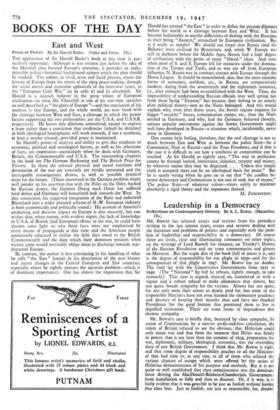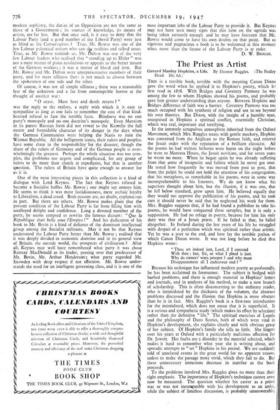Leadership in a Democracy
Reflections on Contemporary History. By A. L. Rowse. (Macmillan 15s.) Ma. ROWSE has selected essays and reviews from his periodical writing in the last sixteen years, essays and reviews dealing with the literature and problems of politics and especially with the prob- lem of leadership and responsibility in a democracy. Of course there are lively, clear and illuminating comments on other topics, on the writings of Lord Russell for instance,-on Trotsky's History of the Russian Revolution and on some commentaries and glosses on Marxism. _But the staple diet of the book (full of juices it is, too) is the degree of responsibility for our plight in 1939—and for the consequences of that plight in 1947. Mr. Rowse has no doubts. The fault lay with the Conservative Governments from 1931 to 194o. (The " National " fig leaf he refuses, rightly enough, to take seriously° This case is argued, insisted on, hammered in with a vigour and a robust refusal to make allowances that almost, but not quite, breeds sympathy for the victims. Almost but not quite, for not only were their errors so dearly paid for, but some of the responsible Ministers have not even learned the elementary prudence and decency of keeping their mouths shut and have not thanked Providence for the good fortune that permitted them to live in dignified retirement. There are some forms of imprudence that destroy sympathy.
Mr. Rowse's case is briefly that, betrayed by class sympathy, by terror of Communism, by a narrow profit-and-loss calculation, the rulers of Britain refused to see the obvious, that Hitlerism could only mean war and that from the moment that Hitler was firmly in power, that is not later than the summer of 1934, preparation for war, diplomatic, military, ideological, economic, was the overriding duty of any British Government. I think that Mr. Rowse is right, and that some degree of responsibility attaches to all the Ministers of that bad time or, at any rate, to all of them who refused the various chances of escape which were offered by the series of Hitlerian demonstrations of his purpose and methods. But it is not quite so well established that Class consciousness was the dominant force driving the MacDonald-Baldwin-Chamberlain Governments from humiliation to folly and then to disaster. Or, if it was; it is fairly evident that it was possible to be just as foolish without having that class bias. Just as foolish, not just as responsible, for, despite modern sophistry, the duties of an Opposition are not the same as those of a Government ; its sources of knowledge, its means of action, are far less. But that once said, is it easy to deny that the Labour Party (and a good number of the Liberal Party) were just as blind as the Conservatives ? True, Mr. Rowse was one of the few Labour polemical writers who saw do realities and talked sense. True, as Mr. Rowse reminds us. Mr. Dalton was one of the very few Labour leaders who realised that " standing up to Hitler " was not a mere matter of pious resolutions or appeals to the better nature of the German workers ; it was a matter of blood and iron. But Mr. Rowse and Mr. Dalton were unrepresentative members of their party, and for mere silliness ther,t is not much to choose between the spokesmen of one side and the other.
Of course, it was not all simple silliness ; there was a reasonable fear of the unknown and a far from contemptible horror at the thought of another war : " 0 cease. Must hate and death return ? "
was the reply to the realists, a reply with which it is easy to sympathise as long as one fails to remember the cost of that kind- hearted refusal to face the terrible facts. Blindness was no one party's monopoly and no one doctrine's monopoly. Even Marxism in its purest Russian forM did not reveal to the Kremlin the full extent and formidable character of its danger in the days when the German Communists were helping the Nazis to ruin the Weimar Republic. All the belligerent states, their rulers and peoples. have some share in the responsibility-for the disaster, though the share of the rulers of Germany and of the German people is over- whelmingly the greatest. Perhaps the whole situation was too com- plex, the problems too urgent and complicated, for any group of rulers to do more than clutch at expedients, but that is another question. The rulers of Britain have quite enough to answer for as it is.
One of the most interesting pieces in this collection is a kind of dialogue with Lord Keynes. The fact that Keynes refused to become a Socialist baffles Mr. Rowse ; one might say annoys him. He seems to think it was mere fastidiousness, mere archaic loyalty to Liberalism, a dead creed. Both reasons are, no doubt, explanations in part. But there are others. Mr. Rowse makes plain that the present condition of the Labour Party is far from filling him with unalloyed delight and confidence. Long a devoted member of the party, he seems tempted to rewrite the famous dictum : "Ne la Republique &air belle sous l'Empire l " And his dedication of his book to Mr. Sevin is a kind of defiance of the dominant intellectual group among the Socialist militants. May it not be that Keynes understood the Labour Party better than Mr. Rowse ; realised that it was deeply divided in economic doctrine and in its general view of Britain, the outside world, the prospects of civilisation ? After all, Keynes may well have remembered what party it was chose Ramsay MacDonald as its leader, passing over that predecessor of Mr. Bevin, Mr. Arthur Henderson-; what party regarded Mr. Snowden with deep respect if not affection. Mr. Rowse under- stands the need for an intelligent governing class, and it is one of the
most important jobs of the Labour Party to provide it. But Keynes may not have seen many signs that this item on the agenda was being taken seriously enough and he may have foreseen that Mr. Rowse would come to have his own doubts on that point. But so vigorous and pugnacious a book is to be welcomed at this moment when more than the future of the Labour Party is at stake.
D. W. BROGAN.



































 Previous page
Previous page